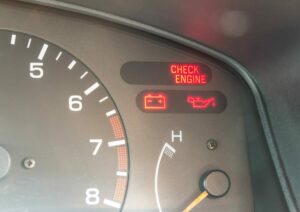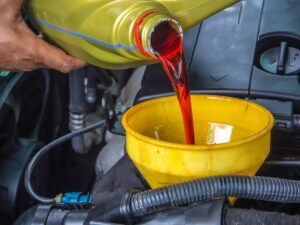Transmission Maintenance: The 5 Most Common Questions

Your car’s transmission is responsible for making sure the proper amount of power is getting to the wheels of your vehicle at any given time in order to drive at a specific speed.
Of all the components of an automobile that need regular maintenance, the transmission is the one that gets the short stick. If you don’t change the oil in your engine, then the engine stops working. That doesn’t happen with transmissions. If you don’t change the fluid in your radiator, the car overheats. That also doesn’t happen with transmissions. As a result, car owners rarely ask for the transmission care needed to keep their transmission working well.
All transmissions need some type of regular servicing and it usually boils down to the frequency at which the transmission fluid has been changed. The longer you wait between transmission fluid changes the higher the risk of serious problems developing with your vehicle. Some transmission fluids need changing every 20,000 miles while others are changed anywhere from 40,000 to 100,000 miles! It’s best to know your vehicle yourself and to familiarize yourself with the owner’s manual. This way, you can avoid spending your hard-earned money on unwanted or unnecessary maintenance.
 1. WHY IS THE CHECK ENGINE LIGHT ON?
1. WHY IS THE CHECK ENGINE LIGHT ON?
If your car’s computer detects a transmission issue, the check engine warning light in the dash may come on. If that happens, the first thing to remember is not to panic. If the light isn’t flashing, you still have time to call us to schedule an appointment, where our mechanics can diagnose the problem and recommend a possible solution. If the problem is indeed transmission related, it’s likely nothing a simple change of the transmission fluids can’t fix. This is best handled by one of our certified mechanics here at Ulmer’s, as for many vehicles even getting to the transmission housing is often a challenge in itself that only auto mechanics and their specialized tools are equipped to handle.
 2. WHY IS THE TRANSMISSION DELAYED WHEN GOING INTO GEAR?
2. WHY IS THE TRANSMISSION DELAYED WHEN GOING INTO GEAR?
People in Cincinnati and the surrounding areas often experience some delay between when the driver puts the transmission into gear and when it actually engages with the engine. That’s called “delayed engagement” and it’s not unusual in colder parts of the world. To fix this, just slow your progression of putting your foot on the gas and accelerating. The delay will dissipate shortly.
It’s also a good idea when you start your car in the morning to run it through the gears with the foot on the brake while the car stands still. That way, you’ll get transmission fluid running through all the gears before you actually start to drive. Just make sure not to rev the engine while it’s cold as this could cause major damage to it!
If it’s not cold out and you notice your transmission has a delayed engagement, it may be something as simple as a transmission filter working improperly. Don’t assume that the transmission as a whole is bad and needs a costly repair like a replacement or a rebuild. Let your mechanic at Ulmer’s figure that out. We could save you hundreds of dollars.
 3. WHY IS TRANSMISSION FLUID LEAKING BENEATH THE VEHICLE?
3. WHY IS TRANSMISSION FLUID LEAKING BENEATH THE VEHICLE?
Transmission fluid is a translucent red color that’s very distinctive. If you see a puddle of it beneath your car, it could be a significant problem, especially if it smells burnt or has a blackish tint to it. Finding the leak in the transmission is difficult for the untrained eye and best left to a professional who has experience on what to look for. A leaking transmission needs to be addressed quickly because the leak will only get worse and your vehicle will quickly stop running properly without replacing the transmission fluid.
Transmission fluid leaks can be caused by a variety of things, such as a gap or empty space in the pan gasket, torque converter, fluid lines, or transmission pan, just to name a few. Determining the exact cause can be tedious and is better left to a professional mechanic.
 4. WHY DOES THE TRANSMISSION SLIP OUT OF GEAR?
4. WHY DOES THE TRANSMISSION SLIP OUT OF GEAR?
If your car has been shifting gears on its own or you experience delays in acceleration after pressing the gas pedal, these may be signs that your transmission is slipping. Further symptoms of transmission slippage include the inability to reverse, burnt smells, and difficulty shifting gears.
Any number of things can cause a transmission to begin to slip, but the most common causes are low fluid levels, worn/broken transmission bands, worn out gears, and problems with the solenoid. If you are seeing any of the above symptoms in your vehicle we encourage you to get in touch with us ASAP. You may be able to avoid completely rebuilding your transmission, which is a costly and time-consuming ordeal, by replacing or repairing a few key parts.
 5. WHAT SHOULD I DO IF MY TRANSMISSION IS JERKING?
5. WHAT SHOULD I DO IF MY TRANSMISSION IS JERKING?
Rough shifts occur when the transmission fluid is getting clogged as it moves through your transmission or when the vehicle is low on fluid. Transmissions are extremely complicated parts of your car and when the shifting becomes rough, it often jerks you as it shifts from one gear to the next. If you’re experiencing this, bring the vehicle to a mechanic and let them look it over. They’ll be able to tell you if it’s simply a matter of low fluid, or if there is a bigger underlying issue at play that could be affecting your vehicle’s performance.
TRANSMISSION CARE: LEAVE IT TO THE PROS
Unless you’re a mechanic, transmission repair is generally not a do-it-yourself project. The possibility of misdiagnosing an issue with your transmission is much higher when you don’t utilize a professional. Specialized equipment and knowledge are required when conducting these types of repairs, and one mistake could cost you an entirely new transition if you’re not careful. When it comes to transmission repair, you can trust your friends at Ulmer’s Auto Care Center to take care of you. Don’t let transmission maintenance sneak up on you; schedule your transmission check-up with us today!










